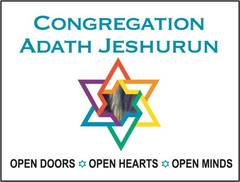The 2024 Naamani Memorial Jewish Culture Event featuring Nancy E. Berg
Sunday, November 3, 2024 • 2 Cheshvan 5785
2:00 PM - 3:00 PMOn Sunday, November 3rd at 2:00 p.m., Adath Jeshurun will host the 2024 Israel Naamani Memorial Event featuring Nancy E. Berg, co-editor of Exile and the Jews: Literature, History, and Identity, the first comprehensive anthology examining Jewish responses to exile from the biblical period to our modern day. Dr. Berg is professor of Hebrew and comparative literature at Washington University in St. Louis. Admission is free but reservations are encouraged. The Naamani Memorial Lecture Series was established in 1979 to honor the memory of Professor Israel T. Naamani, admired scholar and teacher at the University of Louisville, and beloved Jewish community member.
A book signing and reception will follow her talk.
Co-sponsored by Jewish Studies and the Department of Comparative Humanities of UofL.
More about Nancy E. Berg:
Professor Berg teaches courses in Israeli society, Middle Eastern literatures, and Jewish culture. While much of her scholarship focuses on the literature of Iraqi Jews, she has also researched Israeli women's writing, memory writing, and food. Her first book, Exile from Exile, explores the writings of Israeli Jews from Iraq, heirs to the longest continuous Jewish community: Babylonian Jewry. In More and More Equal, her next book, she analyzes the literary career of Israeli writer Sami Michael. What We Talk About When We Talk About Hebrew (And What It Means to Americans), coedited with Naomi B. Sokoloff, won the National Jewish Book Award.
Her coedited volume is the first comprehensive anthology examining Jewish responses to exile from the biblical period to our modern day gathers texts from all genres of Jewish literary creativity to explore how the realities and interpretations of exile have shaped Judaism, Jewish politics, and individual Jewish identity for millennia. Ordered along multiple arcs—from universal to particular, collective to individual, and mythic-symbolic to prosaic everyday living—the chapters present different facets of exile: as human condition, in history and life, in holiday rituals, in language, as penance and atonement, as internalized experience, in relation to the Divine Presence, and more. By illuminating the multidimensional nature of “exile”—political, philosophical, religious, psychological, and mythological—widely divergent evaluations of Jewish life in the Diaspora emerge. The word “exile” and its Hebrew equivalent, galut, evoke darkness, bleakness—and yet the condition offers spiritual renewal and engenders great expressions of Jewish cultural creativity: the Babylonian Talmud, medieval Jewish philosophy, golden age poetry, and modern Jewish literature.
| Share Print Save To My Calendar |


